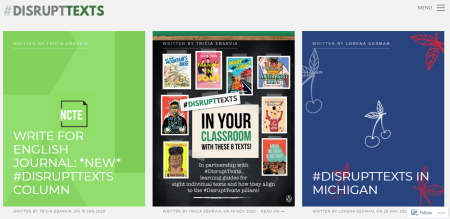#DisruptTexts movement seeking to end racism, bias in teaching clarifies work

There's a growing movement known as #DisruptTexts, led by educators who are seeking to promote “anti-racist/anti-bias teaching pedagogy and practices” in the classroom by creating a more inclusive language arts curriculum.
The group's work has recently been the focus of a passionate debate on social media after WSJ children's book critic and author Meghan Cox Gurdon argued in an op-ed Sunday that they are “purging and propagandizing against classic texts.”
“A sustained effort is under way to deny children access to literature. Under the slogan #DisruptTexts, critical-theory ideologues, schoolteachers and Twitter agitators are purging and propagandizing against classic texts—everything from Homer to F. Scott Fitzgerald to Dr. Seuss,” Gurdon wrote. “Their ethos holds that children shouldn’t have to read stories written in anything other than the present-day vernacular—especially those ‘in which racism, sexism, ableism, anti-Semitism, and other forms of hate are the norm,’ as young-adult novelist Padma Venkatraman writes in School Library Journal.”
Gurdon further noted among other arguments, “The subtle complexities of literature are being reduced to the crude clanking of ‘intersectional’ power struggles,” by the work of the group.
Jessica Salfia, a teacher, writer and co-director of The West Virginia Council of Teachers of English who supports the group, argued in a series of tweets that Gurdon's op-ed is “grossly misrepresenting” their work.
“So the WSJ published an article today, grossly misrepresenting #DisruptTexts. I have listened to @triciaebarvia and @TchKimPossible in person SEVERAL times describe this movement. They have explicitly said that #DisruptTexts is not about banning literature," she began, tagging education experts and leaders of the movement Tricia Ebarvia, Lorena Germán, Kimberly N. Parker, and Julia E. Torres along the way.
“It’s about making sure all voices and perspectives are represented in your curriculum. @triciaebarvia spoke at #WVELA19 & she said verbatim ‘you don’t have to stop teaching Gatsby, but instead, put it in conversation with a text from the same era or about the same era that decenters white voices and perspectives.’ #DisruptTexts has always been about telling the whole story—making sure every person’s voice is valued and every student feels represented in their school’s curriculum,” Salfia continued. “To write a whole oped that misrepresents a literacy movement, takes tweets out of context, and attacks educators of color is gross. And garbage journalism.”
Ebarvia is listed on the group’s website as an English teacher at Conestoga High School, in Pennsylvania; Germán is a Dominican-American educator working with young people in Austin, Texas at Headwaters School; Parker works with preservice teachers as assistant director of teacher training at the Shady Hill School; while Torres has taught Language Arts for 16 years and is currently a teacher librarian for the Montbello Campus serving five schools within the Far Northeast region of Denver Public schools.
The criticism comes amid a tense national debate on issues of race and efforts to foster deeper understanding of issues of inequality through frameworks such as intersectionality and critical race theory.
Critical race theory, as explained by Purdue University, is a theoretical and interpretive mode that examines the appearance of race and racism across dominant cultural modes of expression. Through this framework, scholars seek to understand how victims of systemic racism are affected by cultural perceptions of race and how they are able to represent themselves to counter prejudice. Scholarship on the theory traces racism in America through the legacy of slavery, the civil rights movement and recent events. Intersectionality is the study of how different personal characteristics overlap and inform one’s experience.
Earlier this year, President Donald Trump issued an executive order framing the analytical tools as “offensive and anti-American race and sex stereotyping and scapegoating” after he directed federal agencies to stop teaching government workers about critical race theory and related concepts like “white privilege.”
Teacher Jordan Hohm argued that the WSJ op-ed is “a living display of Critical Race Theory.”
“The latest attack on #DisruptTexts and the women who built it is a living display of Critical Race Theory. In a year where we saw a real weird bashing on CRT, that lazy WSJ piece and the Twitter onslaught since are proving it in real time,” he wrote.
The debate comes as some schools have recently chosen to ban certain classic works that had long been taught. Teachers at Henry Sibley High School in Minnesota were ordered to stop teaching John Steinbeck’s “Of Mice and Men,” as well as Larry Watson’s “Montana 1948,” following complaints of racist stereotypes and slurs.






















